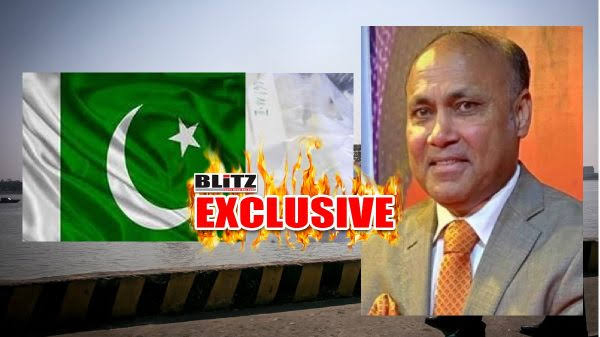Pakistan publicly admits of sending weapons in hidden cargoes to Bangladesh

By M A Hossain
On December 7, during a talk show aired on Zee News, Pakistan Muslim League – Nawaz (PML-N) leader Irshad Ahmed Khan made a startling confession: Pakistan is involved in sending weapons to Bangladesh. He also said, Pakistan wants to “liberate Bangladesh” from Indian influence.
This admission has caused ripples across South Asia, as it substantiates longstanding allegations that Pakistan has been covertly smuggling weapons and drugs into Bangladesh taking full-advantage of the current revolutionary Islamist regime in Dhaka led by Trump-hater Muhammad Yunus.
The claims, initially brought to light by Salah Uddin Shoaib Choudhury in an article in this newspaper (Weekly Blitz), have now gained undeniable traction following this public admission.
Salah Uddin Shoaib Choudhury, a Bangladeshi born Internationally renowned journalist and editor of Weekly Blitz, had exposed the truth behind the smuggling of arms and narcotics from Pakistan to Bangladesh.
His article detailed a well-coordinated network, implicating key players in the smuggling operations and even uncovering plans to disguise cocaine shipments as sugar consignments.
Choudhury’s meticulous reporting included not only the details of these operations but also their potential consequences for national security in South Asia.
What was once dismissed by some as a speculative narrative now stands validated, thanks to the confession by Irshad Ahmed.
His statements have triggered a wave of concern, both within Bangladesh and across neighboring India, where the news has become a national talking point.
This revelation underscores glaring vulnerabilities in the policies governing cross-border trade and security.
A dangerous policy shift had already taken place, removing mandatory customs inspections and security clearance requirements for Pakistani cargo arriving in Bangladesh.
This loophole, exploited by Pakistani smugglers, terrorists, and organized crime syndicates, has opened the floodgates for an influx of weapons, explosives, and narcotics into Bangladesh.
The implications are grave. These unchecked channels provide terrorist organizations such as Lashkar-e-Taiba (LeT), Tehreek-e-Taliban Pakistan (TTP), and other direct access to Bangladesh.
Such groups, many with established ties to global terrorist networks, could then infiltrate neighboring India through its porous borders with Bangladesh.
Adding to the complexity is the role of Pakistan’s intelligence agency, Inter-Service Intelligence (ISI).
It is alleged that ISI not only facilitates these smuggling operations but also oversees the production of counterfeit Indian currency.
Such counterfeit currency, manufactured in sophisticated facilities along Pakistan’s frontiers, is often used to fund terror activities in the region.
The revelations from the Zee News talk show have caused a political and social uproar in India.
Politicians from all parties, along with key policymakers in South Block, have expressed alarm at the security threat posed by this unchecked smuggling.
The incident has sparked a demand for immediate diplomatic and security measures to address the issue.In Bangladesh, the reaction has been more subdued at the official level.
The government has yet to issue a formal statement, raising questions about its stance on Pakistan’s actions and its commitment to national security. However, public sentiment tells a different story.
The news of Pakistan’s smuggling operations has ignited widespread anger among Bangladeshis.
Social media platforms are abuzz with discussions about Pakistan’s intentions and the perceived silence of Bangladesh’s leadership.
Salah Uddin Shoaib Choudhury, in particular, has emerged as a national hero. His revelations have been widely lauded, not only in Bangladesh but also globally.
Social media users from around the world have flooded his accounts with messages of appreciation for his fearless journalism.
Bangladeshi citizens are now questioning the government’s commitment to safeguarding the country’s sovereignty.
The revelations have also cast a shadow over the narrative of friendship between Pakistan and Bangladesh, forcing many to reevaluate the dynamics of this bilateral relationship.
One of the most alarming aspects of the Weekly Blitz article was the disclosure of a cocaine consignment, allegedly disguised as a sugar shipment.
This revelation has highlighted the sophistication of the smuggling network, which appears to operate with impunity.
Choudhury’s account even detailed the procedures of this shipment, offering a rare glimpse into the modus operandi of these criminal activities.
The reaction among Bangladesh’s populace has been swift and intense. Citizens are demanding accountability from their leaders, particularly from the government, which they accuse of failing to address the growing threat posed by Pakistan’s clandestine activities.
The Zee News talk show has done more than just spark outrage; it has shed light on the pressing need for stronger security measures and international cooperation to tackle smuggling and terrorism in South Asia. Both India and Bangladesh must take immediate steps to close loopholes in trade and customs policies.
Additionally, global stakeholders must hold Pakistan accountable for its role in fostering instability in the region.
The confession by Irshad Ahmed is a watershed moment, exposing the lengths to which certain factions in Pakistan are willing to go to destabilize its neighbors.
For Bangladesh, it serves as a wake-up call to reinforce its borders, tighten security protocols, and confront the challenges posed by its precarious geopolitical position.
During the same talk show, eminent Pakistani journalist Arzoo Kazmi said, “If the new Bangladesh government’s relationship with India is not good, then it is obvious that there will be applause in Pakistan”.
VHP spokesperson Vinod Bansal said, “After ruining itself, Pakistan has now taken the contract to ruin Bangladesh as well”.
For Salah Uddin Shoaib Choudhury, this moment represents a vindication of his efforts to expose the truth.
His fearless journalism has not only brought hidden threats to light but has also inspired a collective demand for accountability and action.
As Bangladesh grapples with the implications of these revelations, the nation must rally together to protect its sovereignty and ensure its future stability.
Source : Blitz Bangladesh



